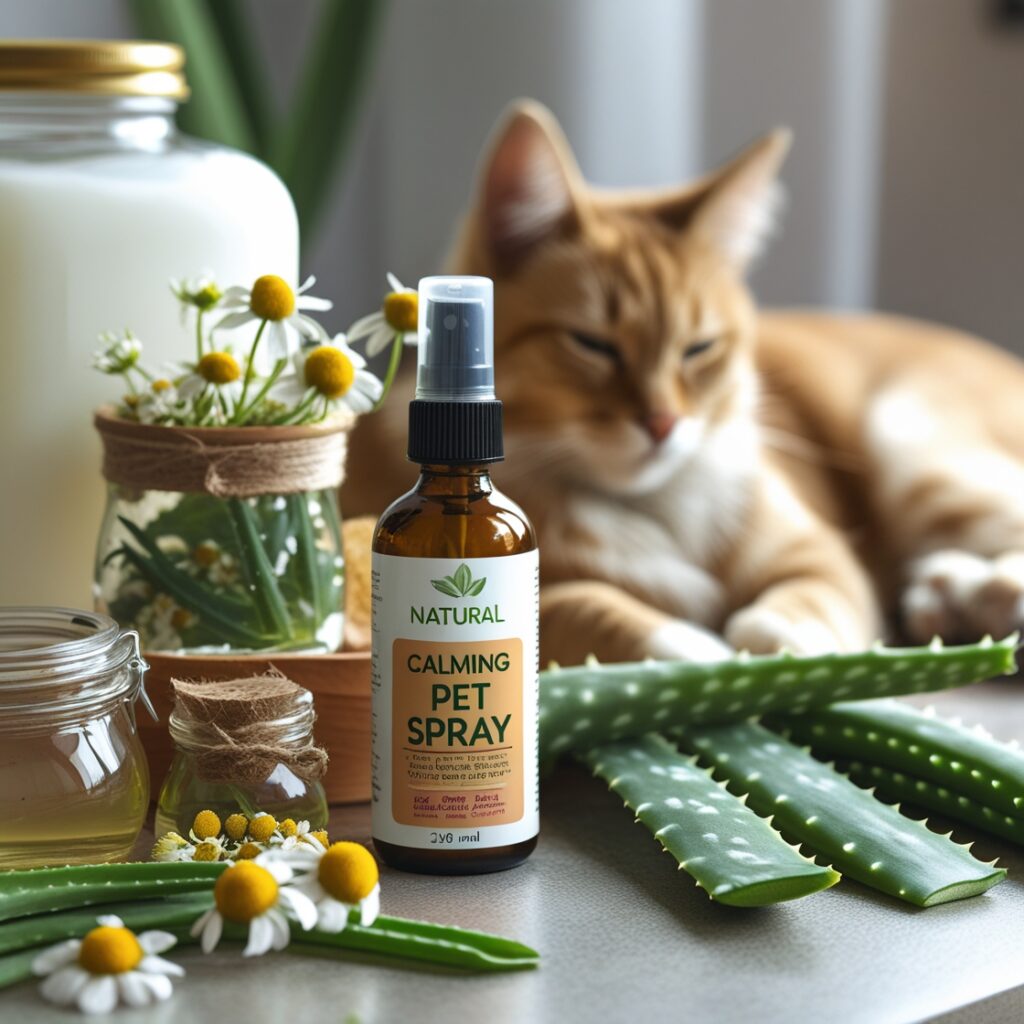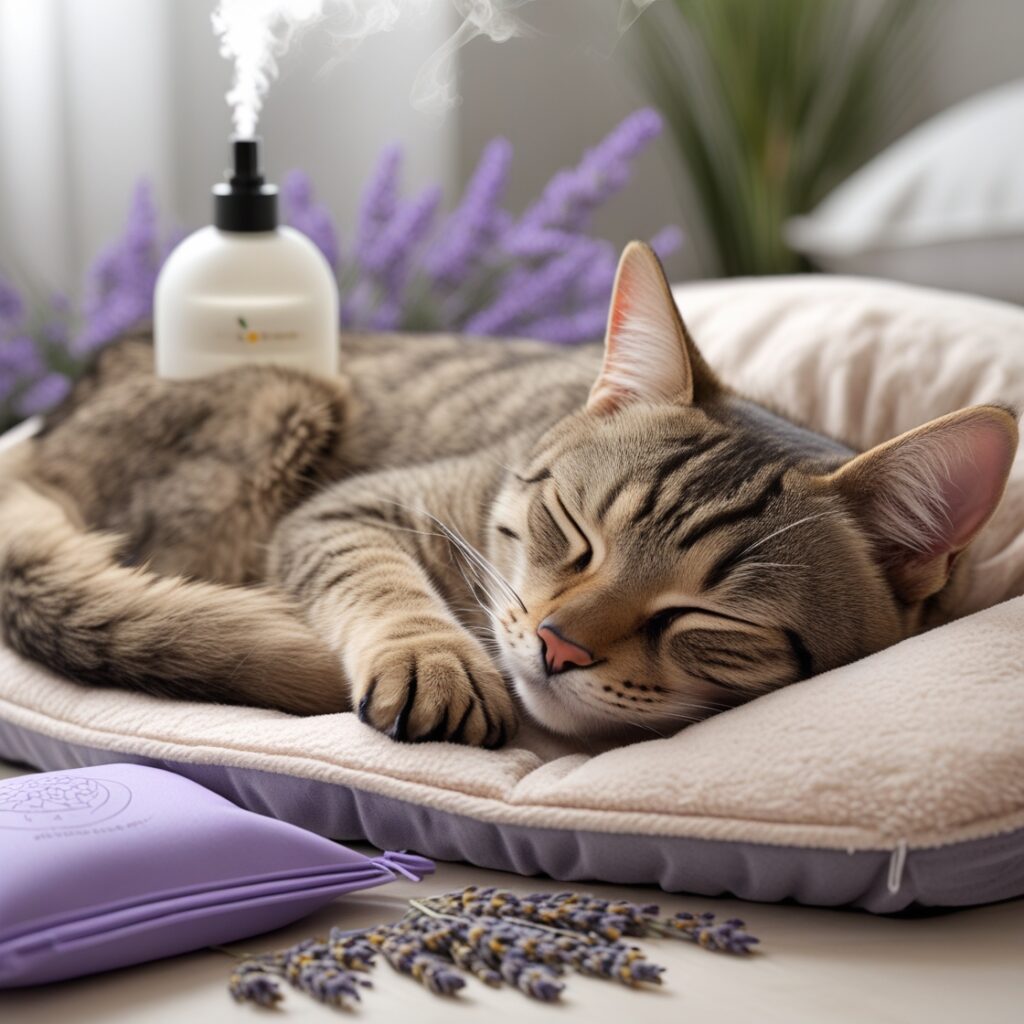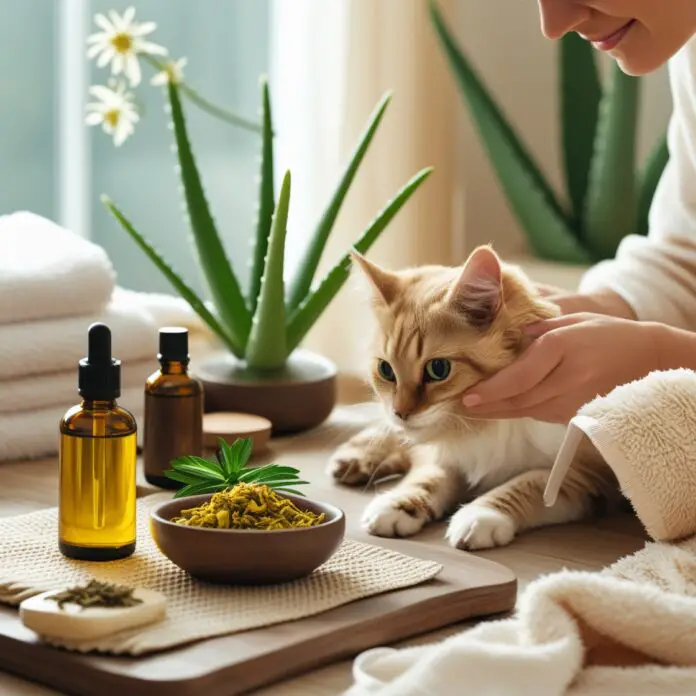Is your furry friend feeling under the weather? 🐾 As pet owners, we often find ourselves worried and searching for ways to alleviate our pets’ discomfort. While veterinary care is essential, many common pet ailments can be effectively managed with natural remedies right at home.
Imagine soothing your dog’s upset stomach with a simple herbal tea or easing your cat’s anxiety with aromatherapy. These gentle, holistic approaches not only provide relief but also strengthen the bond between you and your pet. Natural remedies offer a safe, cost-effective alternative to conventional treatments, often with fewer side effects.

In this comprehensive guide, we’ll explore a variety of natural solutions for common pet ailments, from digestive issues to skin problems, joint pain, and more. You’ll discover how to boost your pet’s immunity naturally and learn the proper ways to administer these remedies safely. Let’s embark on this journey to better pet health, starting with understanding the most common ailments our furry companions face.
Understanding Common Pet Ailments
Identifying symptoms in dogs and cats
As pet owners, it’s crucial to recognize signs of illness in our furry companions. Dogs and cats often exhibit different symptoms, but some common indicators include:
- Changes in appetite or water consumption
- Lethargy or unusual behavior
- Vomiting or diarrhea
- Coughing, sneezing, or difficulty breathing
- Skin irritations or excessive scratching
Recognizing urgent vs. non-urgent conditions
Understanding the severity of symptoms helps determine the appropriate course of action:
| Urgent Conditions | Non-Urgent Conditions |
|---|---|
| Severe bleeding | Mild skin irritations |
| Difficulty breathing | Occasional vomiting |
| Seizures | Slight limping |
| Ingestion of toxins | Minor cuts or scrapes |
| Severe trauma | Mild diarrhea |
When to consult a veterinarian
While natural remedies can be effective for minor ailments, it’s essential to know when professional help is needed. Consult a vet if:
- Symptoms persist for more than 24-48 hours
- Your pet shows signs of severe pain or distress
- There are sudden changes in behavior or mobility
- You suspect ingestion of harmful substances
- Your pet has a pre-existing condition that may be affected
Now that we’ve covered the basics of identifying and assessing pet ailments, let’s explore some natural remedies for common digestive issues in our furry friends.
Herbal Remedies for Pet Digestive Issues
Ginger for nausea and vomiting
Ginger is a powerful natural remedy for pets experiencing nausea and vomiting. Its anti-inflammatory properties help soothe the digestive tract and reduce stomach discomfort. For dogs, a small amount of fresh ginger root (grated) or ginger powder can be mixed into their food. Cats may benefit from a weak ginger tea added to their water bowl.
Peppermint for upset stomachs
Peppermint is renowned for its ability to calm upset stomachs in pets. It can help relieve gas, bloating, and indigestion. However, use caution with cats, as they are more sensitive to essential oils. For dogs, a few drops of peppermint tea added to their water or a small amount of fresh peppermint leaves mixed into their food can provide relief.
Slippery elm for diarrhea
Slippery elm is an excellent natural remedy for pets suffering from diarrhea. This herb forms a protective coating in the digestive tract, reducing inflammation and promoting healing. It can be administered as a powder mixed with water or added to your pet’s food.
Chamomile for gas and bloating
Chamomile is a gentle herb that can help alleviate gas and bloating in pets. Its anti-spasmodic properties help relax the digestive muscles and reduce discomfort. A weak chamomile tea can be added to your pet’s water bowl or food.
| Herb | Benefits | Administration |
|---|---|---|
| Ginger | Reduces nausea and vomiting | Grated fresh root or powder in food |
| Peppermint | Calms upset stomachs | Tea in water or fresh leaves in food |
| Slippery elm | Treats diarrhea | Powder mixed with water or in food |
| Chamomile | Relieves gas and bloating | Weak tea in water or food |
When using these herbal remedies, always start with small amounts and observe your pet’s reaction. If symptoms persist or worsen, consult your veterinarian. Next, we’ll explore natural solutions for skin problems in pets, addressing common issues like itching and hot spots.
Natural Solutions for Skin Problems
Aloe vera for minor burns and irritations
Aloe vera, nature’s soothing miracle, offers excellent relief for pets suffering from minor burns and skin irritations. This versatile plant contains compounds that promote healing and provide a cooling effect on the skin.
How to use aloe vera:
- Extract fresh gel from an aloe vera leaf
- Apply directly to the affected area
- Repeat 2-3 times daily for best results
| Benefit | Description |
|---|---|
| Anti-inflammatory | Reduces redness and swelling |
| Moisturizing | Hydrates and softens skin |
| Antibacterial | Helps prevent infection |
Coconut oil for dry skin and hot spots
Coconut oil is a natural moisturizer that can work wonders for pets with dry skin or hot spots. Its antimicrobial properties also help combat skin infections.
Application methods:
- Topical application: Gently massage a small amount onto affected areas
- Dietary supplement: Add 1 teaspoon per 10 pounds of body weight to your pet’s food
Oatmeal baths for itching and allergies
Oatmeal has long been recognized for its soothing properties, making it an excellent natural remedy for pets suffering from itching and allergies.
How to prepare an oatmeal bath:
- Grind 1 cup of plain, unflavored oatmeal into a fine powder
- Mix with warm water in your pet’s bathtub
- Soak your pet for 10-15 minutes, gently massaging the mixture into their fur
- Rinse thoroughly and pat dry
Now that we’ve covered these natural solutions for skin problems, let’s explore holistic approaches to joint pain and arthritis in pets.
Holistic Approaches to Joint Pain and Arthritis
Turmeric for inflammation reduction
Turmeric, a powerful anti-inflammatory spice, can significantly benefit pets suffering from joint pain and arthritis. Its active compound, curcumin, helps reduce inflammation and alleviate discomfort. For optimal results, mix 1/4 teaspoon of turmeric powder with a small amount of coconut oil or bone broth to enhance absorption.

Fish oil for improved mobility
Fish oil, rich in omega-3 fatty acids, is an excellent natural remedy for improving joint health and mobility in pets. These essential fatty acids help reduce inflammation and lubricate joints, making movement easier and less painful.
| Fish Oil Benefits | Recommended Dosage |
|---|---|
| Reduces inflammation | 1000mg per 10lbs of body weight |
| Improves joint lubrication | Divide dose between morning and evening |
| Enhances overall health | Consult vet for specific recommendations |
Glucosamine and chondroitin supplements
These supplements work synergistically to support joint health:
- Glucosamine: Helps rebuild cartilage
- Chondroitin: Enhances shock absorption in joints
Combined, they can significantly improve your pet’s comfort and mobility. Always consult your veterinarian for proper dosage based on your pet’s size and condition.
Massage and acupressure techniques
Gentle massage and acupressure can provide relief from joint pain and improve circulation. Focus on areas around the affected joints, using light pressure and circular motions. These techniques not only alleviate pain but also strengthen the bond between you and your pet.
Now that we’ve explored holistic approaches to joint pain and arthritis, let’s move on to natural remedies for anxiety and stress in pets.
Natural Remedies for Anxiety and Stress
Lavender for calming effects
Lavender is a gentle yet effective natural remedy for reducing anxiety and stress in pets. Its soothing aroma can help calm nervous dogs and cats, making it an excellent choice for thunderstorms, fireworks, or travel-related stress. You can use lavender in various forms:
- Essential oil (diluted) for aromatherapy
- Dried lavender in a sachet near pet beds
- Lavender-infused pet shampoos or sprays
| Form | Application | Benefits |
|---|---|---|
| Essential oil | Diffuser or diluted spray | Ambient calming effect |
| Dried lavender | Sachet or potpourri | Long-lasting, gentle aroma |
| Infused products | Shampoos, sprays | Direct application, soothing |
Valerian root for relaxation
Valerian root is known for its sedative properties and can be particularly helpful for pets experiencing anxiety or sleep issues. This herb works by increasing the levels of gamma-aminobutyric acid (GABA) in the brain, promoting relaxation. Use valerian root:
- As a supplement in pill or powder form
- In liquid tinctures added to food or water
- Dried and sprinkled on pet bedding
CBD oil for overall well-being
CBD oil has gained popularity for its potential to reduce anxiety and promote overall well-being in pets. It interacts with the endocannabinoid system, helping to regulate mood and stress responses. When using CBD oil:
- Start with a low dose and gradually increase
- Choose pet-specific products from reputable sources
- Consult with a veterinarian for proper dosage
Thunder shirts and calming pheromones
For a non-herbal approach, consider using thunder shirts or calming pheromones. Thunder shirts work by applying gentle, constant pressure to your pet’s body, similar to swaddling an infant. Calming pheromones mimic natural hormones that promote relaxation in pets.
Now that we’ve explored natural remedies for anxiety and stress, let’s look at how to boost your pet’s immunity using natural methods.
Boosting Pet Immunity Naturally
Echinacea for immune system support
Echinacea, a popular herb known for its immune-boosting properties in humans, can also benefit our furry friends. This powerful plant stimulates the production of white blood cells, enhancing your pet’s ability to fight off infections and diseases.
Probiotics for gut health
A healthy gut is crucial for a strong immune system. Probiotics introduce beneficial bacteria to your pet’s digestive tract, improving overall gut health and boosting immunity. These can be found in specially formulated pet supplements or in natural sources like plain yogurt.
Vitamin C-rich foods for overall health
While most pets can produce their own vitamin C, supplementing their diet with vitamin C-rich foods can provide additional immune support. Here’s a list of pet-safe, vitamin C-rich foods:
- Berries (strawberries, blueberries)
- Sweet potatoes
- Broccoli
- Bell peppers
Bone broth for nutrient absorption
Bone broth is a nutrient-dense superfood that can significantly boost your pet’s immune system. It’s rich in minerals, amino acids, and collagen, which aid in nutrient absorption and overall health.
| Benefit | Description |
|---|---|
| Improved digestion | Supports gut health and nutrient absorption |
| Joint health | Collagen helps maintain healthy joints |
| Liver detoxification | Glycine in bone broth supports liver function |
| Hydration | Encourages fluid intake, especially for sick pets |
By incorporating these natural immune boosters into your pet’s routine, you can help strengthen their defense against various ailments. Remember to introduce new foods gradually and consult with your veterinarian before making significant changes to your pet’s diet. Next, we’ll explore how to safely administer these natural remedies to ensure your pet receives the maximum benefits.
Safe Administration of Natural Remedies
Proper dosage calculations
When administering natural remedies to pets, accurate dosage is crucial. The general rule of thumb is to start with a lower dose and gradually increase if needed. Here’s a simple guide for calculating dosages:
| Pet Weight | Dosage Multiplier |
|---|---|
| 0-10 lbs | 0.25x |
| 11-25 lbs | 0.5x |
| 26-50 lbs | 1x |
| 51-100 lbs | 2x |
| 100+ lbs | 3x |
Always consult with a holistic veterinarian for precise dosages tailored to your pet’s specific needs.
Potential side effects and contraindications
While natural remedies are generally safe, they can still cause adverse reactions in some pets. Common side effects may include:
- Digestive upset
- Allergic reactions
- Drowsiness
- Changes in urination or defecation
It’s essential to be aware of contraindications, especially for pets with pre-existing conditions or those taking medications. For instance, some herbs may interact with blood thinners or affect blood sugar levels.
Combining natural remedies with conventional treatments
Integrating natural remedies with conventional treatments can offer comprehensive care for pets. However, it’s crucial to:
- Inform your veterinarian about all natural remedies being used
- Monitor for potential interactions between natural and conventional treatments
- Adjust dosages as needed under professional guidance
- Keep detailed records of all treatments and their effects
By following these guidelines, pet owners can safely harness the benefits of both natural and conventional approaches to pet health care.
Conclusion
Natural remedies offer a gentle and effective approach to managing common pet ailments. From soothing digestive issues with herbs to addressing skin problems with natural solutions, pet owners have a variety of options to enhance their furry friends’ well-being. Holistic methods for joint pain, anxiety reduction, and immune system support provide comprehensive care without relying solely on conventional medications.

As responsible pet owners, it’s crucial to prioritize our pets’ health and happiness. By incorporating these natural remedies into our pet care routines, we can provide our beloved companions with safe, nurturing treatments. Remember to consult with a veterinarian before introducing any new remedies and always administer them carefully. With the right knowledge and approach, we can help our pets lead healthier, more comfortable lives using the power of nature.




I’m really enjoying the design and layout of your blog. It’s a very easy on the eyes which makes it much more pleasant for me to come here and visit more often. Did you hire out a developer to create your theme? Excellent work!